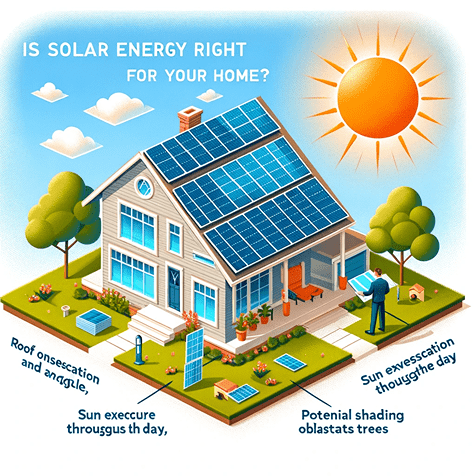Introduction
As solar energy becomes more accessible and affordable, many homeowners are considering making the switch. However, the decision to install solar panels isn’t one-size-fits-all. This blog post provides an in-depth look into the factors that determine whether solar energy is a good fit for your home.
Assessing Your Home’s Solar Viability
The first step in determining if solar energy is right for your home is to assess its solar viability. Key factors include:
Geographic Location
Sunlight intensity varies by location. Homes in sunnier areas typically yield higher solar energy output.
Roof Condition and Space
The age, material, and the space of your roof affect its suitability for solar panel installation.
Energy Consumption
Your current electricity usage will help determine the size of the solar system required to meet your energy needs.
Understanding Solar Panel Costs and Savings
While the upfront cost of solar panels can be substantial, the long-term savings on energy bills and potential tax credits and incentives can offset the initial investment. It’s important to calculate the potential savings against the installation and maintenance costs to understand the financial benefit.
Local Regulations and Incentives
Local regulations and incentives can significantly influence the feasibility of solar energy for your home. Some areas offer tax credits, rebates, or other incentives to encourage solar panel installations.
Installation and Maintenance
Professional installation is key to maximizing the efficiency and longevity of your solar panels. Once installed, solar panels require minimal maintenance, but understanding the upkeep and potential additional costs is important.
Environmental Considerations
Adopting solar energy significantly reduces your carbon footprint. For environmentally conscious homeowners, the benefit of contributing to a cleaner, greener planet can be a primary motivator.
The Long-Term Outlook
Consider the long-term implications of your investment. Solar panels typically come with a warranty of 20-25 years, during which they can provide substantial energy savings.
Conclusion
Determining if solar energy is right for your home involves a careful assessment of your geographic location, roof condition, energy needs, local regulations, and financial considerations. While the benefits of solar power are clear in terms of energy savings and environmental impact, each home’s situation is unique.
To explore if solar energy is the right choice for your home, visit www.GoSolarGlobal.com.


